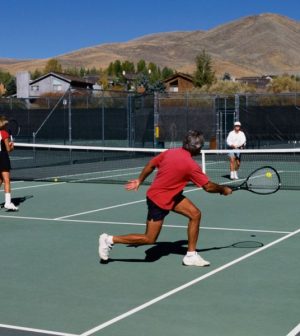- The Long-Term Effects of Daily Turmeric Supplements on Liver Health
- Could Your Grocery Store Meat Be Causing Recurring UTIs?
- Are You Making This Expensive Thermostat Error This Winter?
- Recognizing the Signs of Hypothyroidism
- 10 Strategies to Overcome Insomnia
- Could Artificial Sweeteners Be Aging the Brain Faster?
- Techniques for Soothing Your Nervous System
- Does the Water in Your House Smell Funny? Here’s Why
- Can a Daily Dose of Apple Cider Vinegar Actually Aid Weight Loss?
- 6 Health Beverages That Can Actually Spike Your Blood Sugar
Sports-Linked Cardiac Arrest Rare in Seniors, Study Finds

The saga of Damar Hamlin’s recent collapse during a football game has thrown the dangers of sports-related cardiac arrest into the spotlight.
What about this happening to someone much older?
A new study brings reassuring news: It’s rare for an older adult to have a sudden cardiac arrest during exercise, and those who do tend to have fewer health issues than those who experience this medical emergency outside of exercise, according to researchers.
While exercise is among the most heart-healthy habits, a new study from Cedars-Sinai in Los Angeles noted that it can trigger an irregular heart rhythm that leads to sudden cardiac arrest.
Sudden cardiac arrest occurs when an electrical malfunction causes a person’s heart to stop beating. Most people die within minutes. In recent years, rates of sudden cardiac arrest have increased for older adults.
However, “the annual incidence of sports-related sudden cardiac arrest among older adults is extremely rare,” said senior study author Dr. Sumeet Chugh. He is director of the Heart Rhythm Center in the Smidt Heart Institute at Cedars-Sinai.
For the new study, his team analyzed cases of sudden cardiac arrest in people aged 65 and older in Portland, Ore., and Ventura County, Calif.
The data came from the Oregon Sudden Unexpected Death Study, which began in 2002, and the Ventura Prediction of Sudden Death in Multi-ethnic Communities study, which began in 2015. Both are ongoing studies.
The researchers did not include data from people for whom resuscitation wasn’t attempted or those who had a cardiac arrest while in the hospital. The research included those who died of sudden cardiac arrest during or within an hour of their workout.
Of more than 4,000 cases studied, only 77 (1.9%) happened during or following exercise, with workouts that included cycling, running, playing golf or tennis, or an activity at the gym. About 91% of the cardiac arrests were in men.
Medical records were available for 47 people with sports-related cardiac arrest and more than 3,100 people with cardiac arrest not related to sports.
Those who experienced sudden cardiac arrest during or soon after exercise typically had fewer heart risk factors or other health issues than those who experienced a cardiac arrest not related to exercise, the investigators found.
Sports-related cardiac arrests were more likely occur in a public location, such as a gym. This is one reason they were four times more likely to survive than those who had a non-sports-related cardiac arrest.
The researchers said the health benefits of sports activity likely outweigh seniors’ risk of associated sudden cardiac arrest.
“This means older people who regularly participate in sports should continue,” Chugh said in an institute news release. “Those who develop new symptoms should consult their physician. Those who want to start should be encouraged to do so, but only after consulting their physician and obtaining an exercise prescription.”
The findings were recently published in JACC: Clinical Electrophysiology.
More information
The American Heart Association has more on sudden cardiac arrest.
SOURCE: Cedars-Sinai, news release, Jan. 30, 2023
Source: HealthDay
Copyright © 2026 HealthDay. All rights reserved.










